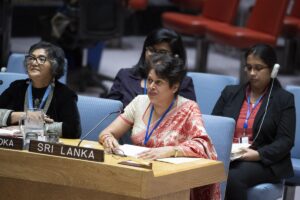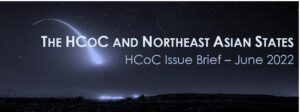20th Anniversary of the HCoC
1 June 2022
Vienna and hybrid
On 1st June 2022, the FRS, with the support of the EU as well as the government of France and of the Netherlands, organised an event marking the 20th Anniversary of the Hague Code of Conduct.
AGENDA
9:00 CEST – Registration and welcome coffee
9:30 – Keynote address
- Mr Philippe BERTOUX, Director for Strategic Affairs, security and disarmament, French Ministry for Europe and Foreign Affairs
9:45 – Motivating factors and ambitions in the HCoC negotiations in 2002
MODERATOR: Mr Alexandre HOUDAYER, Secretary General, Foundation for Strategic Research (FRS)
PANELLISTS:
- Dr Sitki EGELI, Associate Professor, Izmir University of Economics
- Mr Vann VAN DIEPEN, Independent consultant, former Principal Deputy Assistant Secretary of State for International Security and Nonproliferation at the US State Department
- Ms Anne Kari LUNDE, Policy Director for Export Control, Ministry of Foreign Affairs, Norway
KEY ISSUES:
- Genesis of the Code
- Incentive for joining the Code in 2002
- Motivation of the drafters
DISCUSSION
11:15 – Evolution and relevance of the Code today
MODERATOR: Amb. Belén SAPAG MUÑOZ DE LA PEÑA, Permanent Representative of Chile to the United Nations Office and other international organisations in Vienna
OPENING REMARKS: Mr Kaburou SOUMANI, Researcher, Directorate of Defence and Security Affairs, Ministry of Foreign Affairs, Togo
PANELLISTS:
- Mr George-Wilhelm GALLHOFER, Head of Nuclear Disarmament and Non-Proliferation / Executive Secretariat of the Hague Code of Conduct at the Austrian Federal Ministry for European and International Affairs
- Amb. Azzeddine FAHRANE, Permanent Representative of the Kingdom of Morocco to the United Nations Office and other international organisations in Vienna
- Mr Timothy WRIGHT, Research Analyst for Defence and Military Analysis, IISS
KEY ISSUES:
- Universalisation and development of the Code over 20 years
- Incentives and benefits for joining the Code today
- Pertinence of the Code in the current security environment
DISCUSSION
12:45 – Keynote speech
- Mr Joost FLAMAND, Director for Security Policy, Ministry of Foreign Affairs of the Netherlands
13:00 – Buffet lunch
14:30 – Keynote speech
- Amb. Gustavo AINCHIL, Ambassador and Permanent Representative of the Argentine Republic to the International Organisations in Vienna, HCoC Chair 2021-2022

14:45 – HCoC and developments in space
MODERATOR: Dr Xavier PASCO, Director, Foundation for Strategic Research (FRS)
OPENING REMARKS: Prof. Spencer ONUH, Research Director, Centre for Satellite Technology Development, National Space Research & Development Agency, Nigeria
PANELLISTS:
- Mr Mathieu BATAILLE, Resident Fellow, European Space Policy Institute (ESPI)
- Dr Rajeswari PILLAI RAJAGOPALAN, Director of the Centre for Security, Strategy and Technology, Observer Research Foundation (ORF)
- Dr Setsuko AOKI, Professor of Law, Keio University Law School
KEY ISSUES:
- Importance of space developments in respect to HCoC provisions
- Contribution of HCoC to transparency in space-related activities
DISCUSSION
16:00 – HCoC in the global non-proliferation architecture
MODERATOR: Ms Anne KEMPPAINEN, Head of UN Section, EU Delegation to the International Organisations in Vienna
PANELLISTS:
- Mr Kolja BROCKMANN, Researcher, Dual-use and Arms Trade Control Programme, Stockholm International Peace Research Institute (SIPRI)
- Dr Beyza UNAL, Head of Science, Technology and International Security Unit, UNODA
- Ms Emmanuelle MAITRE, Research Fellow, Foundation for Strategic Research (FRS)
KEY ISSUES:
- Role of the HCoC in the global non-proliferation architecture
- Relation with other global instruments dealing with missile proliferation
- The HCoC within the arms control architecture
DISCUSSION
17:30 – Keynote address
- Amb. Suleiman Dauda UMAR, Ambassador and Permanent Representative of Nigeria to the International Organisations in Vienna, HCoC Chair 2021-2022
17:45 – Concluding remarks
- Amb. Stephan KLEMENT, Head of Delegation to the International Organisations in Vienna, European Union
Picture and video gallery
Summary of the event
The Hague Code of Conduct: functioning and role
On 1 June 2022, FRS, with the support of the EU, as well as the French and the Dutch government, organised a one-day event in Vienna to mark the 20th anniversary of the HCoC. This hybrid event took place following the Annual Regular Meeting of the HCoC and was open to delegates from subscribing and non-subscribing states.
The event was open by Mr Philippe Bertoux, Director for Strategic Affairs, security and disarmament, of the French Ministry for Europe and Foreign Affairs. Mr Bertoux recalled the cooperation of France, the Netherlands and the EU in putting together this event, and the historical involvement of these stakeholders in supporting the Code. The main contribution of the Code, regarding non-proliferation and strategic stability was mentioned, and the need to work towards universalisation emphasised.
The first panel aimed at recalling the conditions and environment in which the HCoC was designed and negotiated twenty years ago.
During the discussion, the links between the MTCR and the Code were discussed, as well as the choice made by the initiators of the regime to promote it outside of the UN mechanisms. The choice to exclude cruise missiles from the scope of the Code, largely based on practical considerations, was also explained.
Relevance of the HCoC today
The relevance of the HCoC twenty years after its adoption was the topic of the second session, as well as the functioning of the Code today and its evolution in the last two decades.
During the discussion, the issue of defining precisely the technologies and systems that fall within the scope of the HCoC was assessed, as opposed to allowing for flexibility, especially in the context of the advent of hypersonic gliders that may or may not be included in the Code’s remit depending on the characteristics of the boost-phase. The risk posed by vertical proliferation was recalled, as illustrated by Iran or North Korea, both countries which acquired a few short-range missiles and developed a sophisticated production capacity from these crude arsenals. The importance of continuing work on universalisation and especially bringing a state such as China on board was noted, but also to build a narrative where security commitments are in line with development goals.
The morning session was closed by Mr Joost Flamand, Director for Security Policy at the Ministry of Foreign Affairs of the Netherlands, who noted that all countries have an interest in the issue of missile proliferation and can make a contribution. While the multilateral system is under pressure, it is all the more important to work on existing restraint regimes, to continue outreach and to preserve forums for information sharing and dialogue. Finally, the interconnection between military and civilian technologies is increasingly visible and requires instruments creating a frame for the development and transfer of dual technologies.
HCoC and developments in space
The afternoon session was opened by Ambassador Gustavo Ainchil, Permanent Representative of Argentina to the international organisations in Vienna. He reflected on the creation of the Code twenty years ago and the combination of political will, shared security assessment, appropriate content and involvement of relevant actors that enabled its adoption. He noted that outreach efforts were necessary to push states that assessed twenty years ago that it was not in their security interest to join the Code to reconsider their decision, especially states that criticized the inception of the Code or states without capacities who might feel that the Code is not relevant for them. While the anniversary might be a good occasion to reflect on the need to update the Code, any attempt to improve the instrument should take into account the feasibility of any proposition and its compatibility with urgent security needs.
The next session tackled the role of the Code with regard to space activities. The dual nature of the Code and its regulation of peaceful space activities is a consequence of the proximity between satellite launchers and ballistic missiles.
The discussion mentioned the bridges between the non-proliferation and the space communities, the best way to integrate private companies in the debate and how the Code could inspire regulations regarding debris-creating activities in space.
HCoC in the global non-proliferation and arms control architecture
Similarly, the last panel aimed at putting the HCoC in the context of the more global arms control and disarmament architecture.
The incoming Chair, Ambassador Suleiman Dauda Umar, from Nigeria, delivered remarks at the end of this session. Starting by recalling the difficulties met during the formal Annual Regular Meeting this year, he noted that it was essential to keep in mind the objectives of the instrument and to use the challenges of the day to improve the mechanism.
Concluding the event, Ambassador Stephan Klement, Permanent Representative of the European Union in Vienna, wished the event had happened in a more celebratory context and condemned the Russian invasion of Ukraine, but noted that the tragic backdrop illustrated the relevance of CBMs and of multilateralism. He recalled the importance of working toward universalisation of the Code and reiterated the support of the EU to this objective, implemented on the ground by the FRS through a series of activities.


